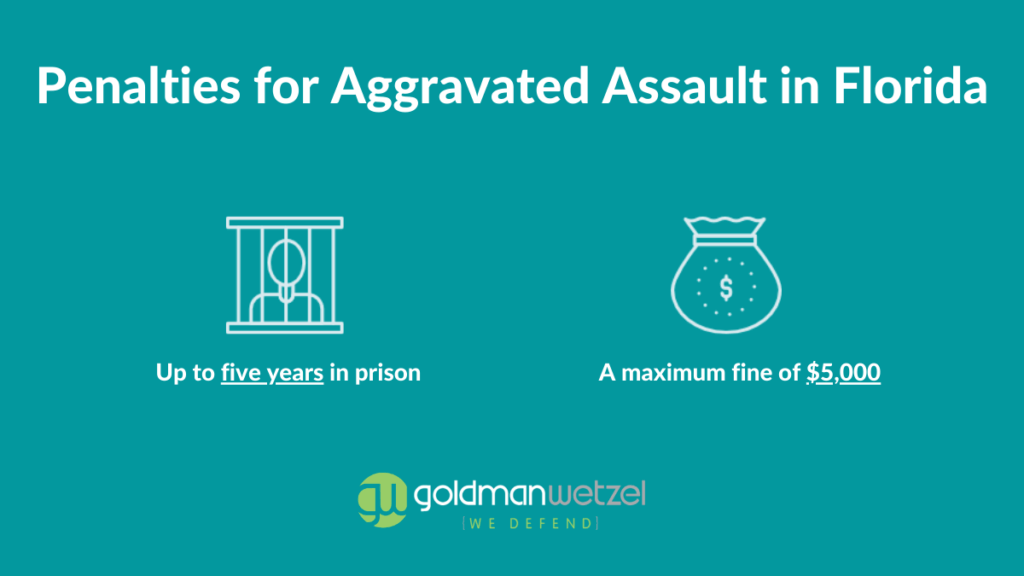When charged with a criminal offense, it is not always clear what the charges mean and the potential consequences that you could face. As one of the more common crimes, it is important to understand what is considered aggravated assault in Florida.
In Florida, an aggravated assault is a more severe form of assault. In other words, a simple assault becomes aggravated if the offender used a deadly weapon without the intent to kill or assault a person with the intent to commit a felony. While simple assaults are misdemeanors, an aggravated assault is a felony.
Facing charges for an aggravated assault can have severe impacts in someone’s personal and professional life. Continue reading for more information about what an aggravated assault is in Florida, the punishment and penalties that you might face and some possible defenses for this type of crime.
What is Aggravated Assault in Florida?
According to Florida Statute § 784.021, aggravated assault is a more severe form of assault. As a reminder, a simple assault consists of threatening someone (either physically or verbally) to cause him or her harm. Additionally, there should also be an apparent ability for the perpetrator to carry out the threat which creates fear in the other person that violence is imminent.
So for example, threatening to punch your neighbor if he lets his dog in your yard could be an assault. Threatening a neighbor while holding a baseball bat at your side might be aggravated assault. When it comes to assault offenses, the circumstances that surrounded the crime will aid prosecutors in determining your charges.
Elements of Aggravated Assault in Florida
As mentioned before, aggravated assault is a more serious form of assault. In other words, an aggravated assault is conformed by one or both of the following elements:
- Use of a deadly weapon without the intent to kill
- Assaulting a person with the intent to commit another felony
Contrary to popular belief, an aggravated assault with a deadly weapon does not necessarily imply the use of a firearm. In fact, a deadly weapon is any object or instrument that can be used as a weapon to cause great bodily harm. Some examples include: knives, rocks, baseball bats, vehicles and broken bottles.
In Florida, an offense can also be charged as aggravated assault if this offense was committed with the intent to commit another felony. This means that if the defendant assaulted the victim in order to commit another felony crime, he or she can face aggravated assault charges. The list of offenses that can be classified as felonies is very broad, but some examples include murder, sexual battery, kidnapping and robbery.
Related Resource: Difference Between Assault and Battery in Florida
Florida Aggravated Assault Penalties
While most cases of assault are misdemeanors, in Florida, an aggravated assault is classified as a third-degree felony. This type of offense can result in up to 5 years imprisonment, probation, and/or a $5,000 fine. However, penalties can be harsher depending on different factors.

When it comes to aggravated assault charges, it is important to keep in mind that there are other factors that could potentially increase your penalties. For example, if you are accused of firing a gun during the incident, you might face up to 20 years of prison.
On the other hand, if a person is accused of committing an assault while committing another felony, the defendant would face separate charges and penalties for the other offense.
Depending on the circumstances of the case, an aggravated assault could result in severe penalties. Retaining legal representation early on could help you reduce your charges. Contact our team of criminal attorneys to book a free consultation.
How to Beat Aggravated Assault Charges in Florida
It is quite easy for prosecutors to charge someone with aggravated assault because they do not need to prove the alleged victim was actually touched or harmed. They only have to show that the defendant threatened the alleged victim with violence.
By the same token, it is also easy, in some situations, for defense attorneys to fight aggravated assault charges because the prosecutor often has a hard time gathering actual proof of threats being made. There is no bodily harm, so it frequently winds up being a case of the alleged victim’s word against the defendant’s word.
There are different defenses that our criminal defense attorneys may be able to use for an aggravated assault case. Some of them include:
- You were acting in self-defense.
- Your actions were covered under Florida’s Stand Your Ground law.
- The alleged victim is falsely accusing you.
- You were justifiably defending another person or your property.
- The alleged victim was exaggerating the exchange and never really thought he was in any danger.
- You had no way of actually carrying out the threat.
- You made a threat (assault) but it did not constitute aggravated assault (no deadly weapon or attempt to carry out a felony).
- The object involved does not constitute a deadly weapon.
Even though these are some common defenses against aggravated assault charges, keep in mind that the strategies that a lawyer might pursue depend on the circumstances of each case.
Contact a Florida Assault Attorney
Aggravated assault charges can end up with severe penalties that will affect your rights and freedom. As a result, you should enlist the help of an experienced criminal attorney.
If you or your loved one are facing criminal charges, contact our assault attorneys to discover your legal options. Send us a message via contact form or call us at 727-828-3900 to schedule a free, no-obligation consultation.

